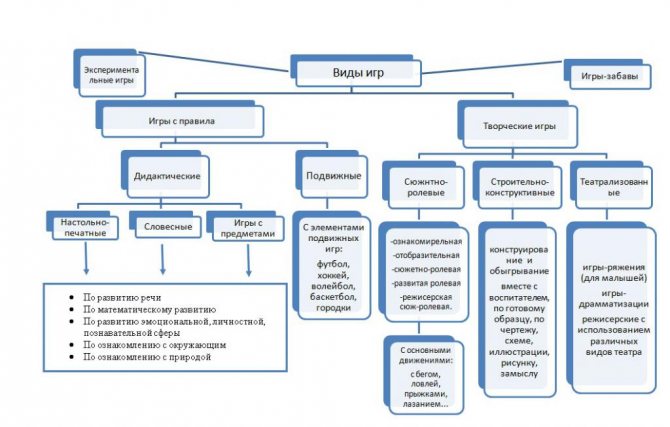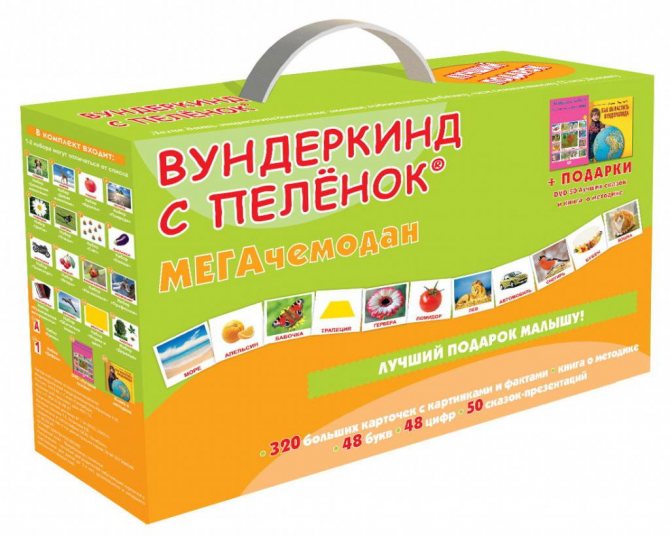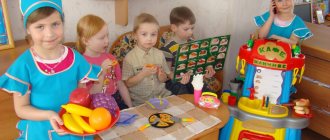: Reading time:
Today, all parents are concerned about the early development of their child, almost from the cradle they take him to developmental studios, numerous clubs and sections. A child is taught letters as soon as he begins to walk, or even earlier. The desire to raise a child to be a genius leads to the devaluation of a simple game. She seems like a waste of time to parents. Is it really? What are the benefits of games for children? Psychologist Victoria Melikhova tells.
Before the baby can even stand on his feet, his mother takes him to the development studio. Experienced teachers offer a wide variety of classes to develop motor skills, memory, attention, thinking, speech, and emotional intelligence. Methods have been invented to teach letters and numbers to a one-year-old baby! Dancing, sports, swimming pool, gymnastics, speed reading, special kindergartens with a slope, mental arithmetic for preschoolers... And then preparation for school appeared on the horizon.
“I try to give my child everything. It is still small, which means it absorbs like a sponge. I don’t want to miss the moment, because later it will be much more difficult for him to learn and develop than now,” says the mother of a wonderful baby. “Besides, running from circle to circle, I myself feel significant and valuable to him, because I do everything that depends on me.”
We will not talk about the benefits or harms of early development and such upbringing (of course, parents are guided by good goals), but we will draw attention to the fact that in such a “race for development” the child does not have time to just play.
Parents don't understand why children should play
In my practice, I have often encountered the fact that parents often underestimate children's play. I have to explain to parents why children need to play.
“Just leave him unattended, so he will immediately start playing around.”
We begin to figure out what it means to “play around”: taking toys out of the closet, throwing construction sets around, running around the room with a typewriter, scattering beans with a spoon... Wait a minute! It seems that what we are talking about here is that the child is playing. He examines toys and studies surrounding objects. Curiosity is one of the most important qualities for a baby! He is trying to “cook soup”, pretending to be a taxi driver. Only for mom all these actions are united by the word “indulge.” A separate problem is if this happens in public places.
“She is constantly mischievous. Either he will bring stones and place them in the middle of the room, or he will pour sand on the table. As soon as I turn away, something will inevitably be pulled over my head. I just don’t have the strength.”
Yes, often children during games (especially mobile and active ones) can cause some inconvenience, ruin the established order, turn over toys and even stain the carpet. But are these losses comparable to what a child receives during simple games... So why do children need games?
What children's games teach
It's not just about entertainment. Let us remember that at every age a person has a leading type of activity. This is an activity during which growth, learning, personality formation, and the development of all skills, knowledge and abilities occur. And for a child, such an activity is precisely play.
What does the game give to children of different ages?
The youngest children tend to manipulate objects. They study the material world. They can look at objects, perform incomprehensible actions with them, taste them, smell them. They are interested in how the stone falls, so they will throw it many times and watch it fall. They are fascinated by the process of pouring sand. Grain of sand to grain of sand. He falls, hits the table and bounces again. Well, why not magic!
The most important thing is that all these actions are performed by the child himself. He can influence objects and move them. It is he who creates the sound of falling stones and running water. Oh, how great he feels at this time, how he wants to share his achievements with you! And how many interesting things there are around!
In addition to the physical meaning of throwing objects, which consists in studying its properties, the sound when falling, the ability to influence the environment, there is also a psychological meaning.
Oh, how great he feels at this time, how he wants to share his achievements with you! And how many interesting things there are around!
The child scatters pencils - the mother collects them and returns them. Pencils are coming back. They go away for a while, walk, but then return home. The mother accepts the child and the abandoned pencils and returns them. If something goes away, it will come back. The mother who left the room will return, the baby who went for a walk will return. After departure comes return, there is a cycle. This is how one becomes aware of the basic patterns, what children’s games teach, among other things.
At the level of objective play, the child is still of little interest in peers and communication. All their attention is focused on themselves, surrounding objects, their physical properties and studying their ability to influence these objects.
Gradually, the child begins not only to throw objects and try them out, but also to study their generally accepted properties and pay attention to their functions. You can eat with a spoon, the car rolls, and you can build a tower out of cubes. And finally, around the age of three, plots appear in a child’s games.
The kid comes up with fantastic stories and builds new worlds. He becomes a warrior or a cook, a mother or father, a teacher or a doctor. The child tries out various social roles, tries them on himself, he rehearses for adult life.
You can live thousands of lives in a day, experience a wide variety of images, and experience the most unpredictable situations.
The child tries out various social roles, tries them on himself, he rehearses for adult life.
Games contribute to the development of a child’s imagination, fantasy, and creative potential. The baby learns to experience a variety of feelings. Today he is an angry wolf, and tomorrow he is a cowardly hare or a brave lion. He learns, helps himself to understand what it’s like to be angry, to be afraid, to fight.
In the game, the child learns to communicate, looks for his place in society, in life. It’s like he’s rehearsing life itself! And for this he was given his entire childhood.
What types of games are there?
Let us repeat that play is very important in a child’s life, and it is necessary to use different types of games for his comprehensive development. There is a generally accepted classification of games with children. It is convenient to present it in the form of the following diagram:

Let's take it in order and give examples.
An experimental game is a game based on conducting experiments. Such games will be of interest to children in the middle and senior preschool groups (that is, as a game for children of the third year of life and older), since they require concentration and perseverance. The experiment can be roughly divided into 3 stages:
- the child is watching the experiment: you need to interest the baby, don’t start with a boring theory, show your “class” and he will be ready to listen to you;
- the child is preparing an experiment together with an adult: it is very important at this stage to actively help the child, let him understand the principle of operation and gain courage for further independent activity;
- the child experiments on his own: adult control is also necessary at this stage, but here you can give the young scientist freedom of action and become involved in the process only at his request.
These types of games in the life of a preschool child develop a creative approach, interest in science, the ability to collect and process information, and a craving for cognitive activity. During the experiments, do not forget to invite your child to first build a hypothesis (suggest what should come out of the experiment), then confirm or refute it experimentally and draw conclusions (what happened, what didn’t, why). This will teach him to consistently present his thoughts, structure and explain what he sees, and, of course, this will definitely be useful in later life.
As an example of such games, the sets “Young Chemist”, “Entertaining Biology” and others are perfect. They are sold in any children's store, and their selection is huge. You can organize an experiment at home, for example, by growing onions from a bulb. Use your imagination. Not only kids, but also their parents will enjoy experimenting.
Games with rules - we are talking about games according to certain established rules, which are often formed historically (tag, hide and seek). Depending on the situation and desire, they can be supplemented or new conditions can be invented together with the kids.
Such games in the life of a young child develop communication skills, because they are often team games. It is both about confrontation and rivalry, and about well-coordinated teamwork to achieve the best overall result. This is very important for the development and socialization of children.
Such games are divided into the following subtypes:
- Didactic - games in a child’s life aimed at developing perseverance, attention and following the rules. As a rule, they are equipped with certain equipment (cards, the game “Try to catch up”), but the conditions are most often strictly limited, there is also a system of fines and rewards, which actively teaches the child to follow certain limits.
- Mobile – the basis of the game is physical activity. It is more convenient to conduct such activities in the fresh air or in a specially equipped room (a sports corner at home or in a kindergarten, for example). Preschool children need to move a lot, this is inherent in nature. We just need to direct the activity in the right direction and ensure, if possible, the safety of the child. It is also worth noting here that we are not talking about sports sections: sports are important and necessary, but are aimed at honing the necessary skills only for a given type. It is important for us to develop the child harmoniously and comprehensively, which means rounders or hide and seek will be much more effective than, say, basketball. It is important to instill in your child a love for such activities, especially in the era of computer games, because, as you know, it is extremely difficult to get rid of an established habit. So let your habits be useful.
Creative games are games entirely aimed at developing creative thinking and imagination. They are quite difficult for an adult, because it is impossible to predict in advance what the child will do and how, which means it will not be possible to prepare.
They are divided into the following subtypes:
- Role-playing games in a child’s life - playing out real life situations or stories from favorite books and cartoons. Since such activities involve the distribution of roles and following a certain outline of the plot, they allow the child to try out various social roles (doctor, mother, villain from a fairy tale), and also clearly show what is good and what is bad, helping to better and faster learn those or other standards. Among other things, the baby actively develops speech and memory.
- Construction and construction - various construction sets, cubes and other materials that allow the child to show his imagination and realize it with the help of certain tools. The game is not limited to one set of objects, you can connect several of them, this will make the process even more interesting and varied.
- Theatrical - in essence, this is the same plot-role-playing game in the life of a child, but involving the presence of spectators (this could be parents or, for example, peers). Among other things, theatrical performances allow the child to overcome embarrassment, teach him to communicate with the public, and the ability to speak clearly and expressively.
Fun games are humorous, relaxing activities. These can be various nursery rhymes, finger games, repetition games (we repeat the actions after the leader) or, for example, tickling. The role of such a game in a child’s life is that it allows both adults and children to relax and relieve stress.
It is necessary to include, if possible, all types of activities in communication with the child so that his personality can develop harmoniously. In this case, he will grow up agile, well-mannered, diligent, with the skills of working in a team and speaking in public. All this will be useful to him in one way or another both during school and in adult life. Parents, first of all, must set an example that the child should follow, and any child will be able to accept, master and apply the idea he sees to himself.
Do we know how to play with children?
At the very beginning of my journey as a child psychologist, I often caught myself thinking how difficult it was to just play. Come up with a plot, fantasize... Reduce control a little and give free rein to your emotions. Feel the child, pick up his script and complement it, help unfold his logical chain. Join his activities and add a new element, a new direction. What a huge effort it takes to become a child again!
At the first meetings with parents, I am interested in how and what they play with their child. A few answer that during joint games they assemble construction sets, puzzles, draw, roll cars or participate in role-playing “productions.” Most say that they look at letters and numbers with their child, name animals, ask them to give or bring some kind of toy, show parts of the body - they focus on intellectual games. One words are taught.
When parents find out that they need to play with their child, and specifically in his game, they are very often lost. You can see in their eyes that they simply don’t know how to do this.
Then I try to help: I ask what mom played when she was little. Few people can remember anything more than just dolls and daughters and mothers. The memory of his childhood remains so deeply hidden that questions about the game are puzzling.
Early development – is it worth getting carried away?
Today, parents are increasingly interested in the topic of early development and offer their children various educational activities and cards. We try to focus on the development of the baby’s intelligence and mental abilities. Sometimes it takes the mother several hours to prepare such exercises, but the baby may not be at all interested in the proposed activity. Common situation? How to be? It is important to understand that parental initiative is important, but must be limited in order to give the child the opportunity to choose the game himself, show his imagination, and involve someone else in the game. While playing, he leads the process, while in the rest of his life he is in a subordinate position due to his age.
Of course, you should not ignore early development methods, but you should know when to stop. Educational games must be present in a child’s life. By overly imposing such activities on young children, we deprive them of the opportunity for choice and self-realization, and also limit their creativity. Play is much more important in the life of a preschool child, and this should always be remembered.
Here are examples of early development methods; perhaps readers will be interested in some of them:

- Doman cards are pictures on various topics (animals, transport, fruits, etc.) with names and tasks on the back. Available in different languages. They need to be shown to the baby several times a day, so the child can remember the visual image of the object and its spelling.
- The Montessori method is a series of books on the upbringing and development of children. The idea can be formulated with the phrase “help me do it myself.” The technique is aimed at ensuring that the child himself experiences and learns new things through experience, and not through explanations from adults.
- The Nikitins’ method is aimed at children’s independent development and exploration of the world. The bottom line is that we do not teach the child, but only create for him a favorable atmosphere for learning.
- Waldorf pedagogy - divides the development of a child into 3 stages: up to 7 years of age, learning through imitation of adults, from 7 to 14 we connect feelings and emotions, after 14 years we add logic. It also focuses on the lack of access to television and computers for preschool children.
- Zaitsev's cubes are a set of manuals in the form of cubes for teaching speech, reading, mathematics, English, in a game format using audio recordings.
In any case, the role of play in the life of preschool children is very great, but parents decide whether or not to focus on a specific development plan. There are many options and techniques; Is it worth sticking to any one trend or is it better to take a little from each idea - the choice is ours.
Watching a child play
The most important work of a psychologist consists of carefully observing the child’s play, following the plot, and the main characters of the game. The child cannot yet clearly express his thoughts and feelings. But he can show everything perfectly in the game.
He won’t say that he was scared of the dog, but the image of a large animal with sharp teeth always appears in the game.
The baby, who recently lost his status as the first-born, buries in the sand all the objects that catch his eye. He's trying to fit a big car into a small garage. Careful observation of his actions will show his desire to become small again, when he was the only one, when he was placed in his mother's tummy, where it was warm and calm.
Every action of a child, every toy he takes is equivalent to adult words, thanks to which we can understand what is going on in the soul of a little man.
Now he's big. Returning to the tummy is impossible. But you can play it. And at the same time, experience many feelings: the desire to return to infancy, the pain of the impossibility of realizing this desire, the support of a loved one nearby at this difficult moment for him.
Another child constantly pushes the cars against each other, hits each other with one car, and sprinkles sand on it. After talking with my mother, I find out that there is a boy on the playground who constantly offends this child. However, because the offender is older, the baby cannot give him “change.” But he lives all his feelings in the game.
Experienced, conscious, and manifested feelings in play cease to torment the child, relief sets in - this is also an important task of games, they provide relaxation. Every action of a child, every toy he takes is equivalent to adult words, thanks to which we can understand what is going on in the soul of a little man, what he thinks about, what he dreams about, what worries him.
What else is important to know about play as a method of educating and developing a child’s personality?
Play occupies an important place in a child’s life, because it is considered as a form of his upbringing. It is through her that the baby learns socialization, strengthens character, learns etiquette, develops intelligence, and perceives moral values. And this is how a child’s personality is formed.
Surely many parents have noticed that most everyday tasks, be it dressing/undressing, eating, putting toys back in place or bathing, are perceived by the child as a game. It is often much more effective to convey your idea to a child through gameplay: show it on toys, explain it when contacting peers. And even if it seems to us that the child is “going too far” and is not behaving seriously, most likely this is not a conscious action, but a subconscious attempt to comprehend the demands of adults through the world available to him, that is, through play. It is important for adults to grasp this fine line and try to help their child cope with the task as much as possible. We should not do anything instead of children, but we can well show by example that things like their places, that fighting is bad, that sharing is necessary. Believe me, the child learns very quickly through play, and what he did yesterday with soft toys, today he will be able to demonstrate in real communication, for example, in kindergarten or when going to the grocery store.
Another important point that I would like to especially note is praise. Praise your children: for a fulfilled request, for a correctly assembled nesting doll, for putting things away. This is how he can understand that he is on the right path. And if today the baby heard that he did a great job because he ate all the porridge himself, then tomorrow he will be the first to grab a spoon in anticipation of breakfast, it will only be important for us to repeat to him that he is doing everything right and is helping his mother a lot.
Play is a key part of your child's life. It is she who helps the individual develop comprehensively, learn about the world around him, understand it, motivates, teaches communication and interaction. For parents, playing in a child’s life not only allows them to establish communication with the little person, but also gives them the opportunity to occupy them for a while without their participation, which is also important.
There is a huge amount of material on this issue; it is only important to adapt the information to a specific child or group of children, depending on age and level of development. Don’t be afraid to experiment, try different options, fortunately there are many helpers in the modern world (websites, blogs, specific specialists). Scientists consider the importance of play in a child’s life to be enormous. It is only important to remember that children are individuals with their own preferences, they will definitely find their own way, and we, adults, can and should help the little person adapt to this world.






